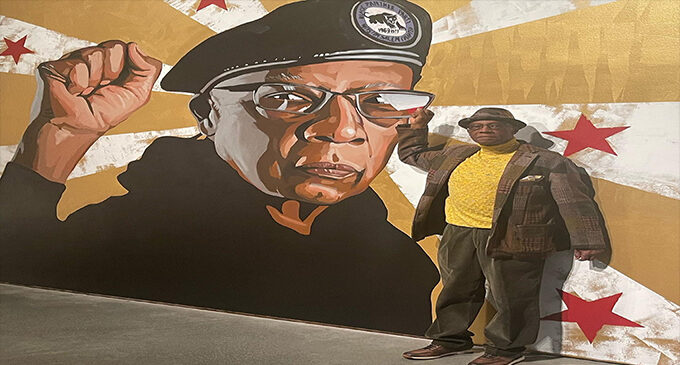Still Fighting: Larry Little Shares New Chapter in His Esophageal Cancer Journey

By Tevin Stinson
The Chronicle
According to the National Cancer Institute, last year an estimated 22,370 people were diagnosed with esophageal cancer. One of those diagnosed was local legend and champion for civil rights everywhere, Dr. Larry Little, co-founder of the Winston-Salem chapter of the Black Panther Party. Thanks to early detection, chemotherapy and radiation treatment, Dr. Little’s cancer is in remission.
“They said there’s no evidence of cancer with the last CAT scan. They want me back on the sixteenth of this month for another CAT scan and if that shows the same thing, then they feel good and they’ll just see me periodically,” Little said.
Little says that his cancer journey began during a routine visit to the dentist. Little was told that he had some scarring on his throat and swollen lymph nodes. It was recommended that it be looked at by a physician. The next day Little made an appointment with an otolaryngologist and after a few tests, they started asking him questions like: Do you smoke? Have you ever smoked? Did your parents smoke?
“I’m not a smoker, never been a smoker. Never smoked weed, never smoked cigarettes,” Little explained while discussing his diagnosis.
Doctors also saw a growth on Little’s lungs and they thought the cancer may have spread. It was later determined that the growth was a result of sarcoidosis, a disease characterized by the growth of tiny collections of inflammatory cells (granulomas) in any part of your body – most commonly the lungs and lymph nodes. Although there is no cure for sarcoidosis, it is treatable, and Little has lived with the disease for over 15 years.
“That’s what triggered the alarm because if the cancer had spread from my throat to my lungs, then I probably wouldn’t make it,” Little said. “Unfortunately, sarcoidosis shows up in the lungs just like cancer in the scans.”
Dr. Little’s treatment began last fall with seven weeks of chemotherapy. After that he underwent 35 radiation treatments. During treatments Little said he lost his hair, about 30 pounds, and the ability to talk and walk. “It was a really rough journey, and I thank the mighty God that I’m almost in the clear,” said Dr. Little while talking with The Chronicle last week.
“Sometimes I couldn’t sleep, I was totally disoriented; it felt like I was standing on my head. But I had a good support system. My siblings, my children, my friends, I had about 10 people who would take me to treatment, and I was very thankful. And my doctors, Dr. Demetria Jacks, Dr. Kelli Reardon, and Dr. Meredith Smith, were amazing. They just kept encouraging.”
When he was first diagnosed, Little said he was going to keep it to himself but decided against it. He said he saw it as an opportunity to encourage others to get checked out, especially Black men. According to the American Cancer Society, Black men are more likely to develop throat cancer and more likely to die from it. It’s important to make regular appointments with your doctor if you notice any signs of throat cancer. Most throat cancer symptoms aren’t specific to cancer, so a doctor will likely investigate other common causes as well.
“The good thing is we got it early and that’s why I decided to talk about it, because oftentimes brothers get diagnosed with cancer and it’s metastasized because we’re reluctant to get checked,” Little said.
To remind him of what he’s been through over the past few months, Little keeps his radiotherapy mold in his living room, right next to his keepsakes and pictures from his days with the Black Panther Party. He said treatment gave him a time to reflect. Little admits there were times when he didn’t think he would make it, but he was determined to fight. And now that he can see the light at the end of the tunnel, and with the state of the political landscape, Little said there’s work still to be done.
“I was at peace because I feel the Lord’s will, will be done,” Little continued. “I’d like to be here a while longer; I feel I have something to offer my community, my people, and the struggles. Particularly now, this is a dangerous period in the history of our country.”









